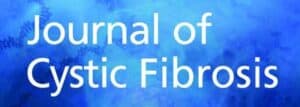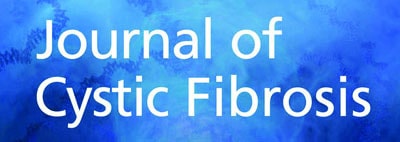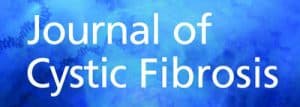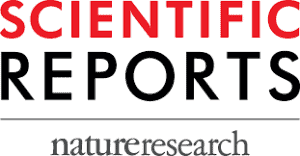Emily’s Entourage supported the research that resulted in the following publications.

JOURNAL OF CYSTIC FIBROSIS
October 2024
A W1282X cystic fibrosis mouse allows the study of pharmacological and gene-editing therapeutics to restore CFTR function
AUTHORS
Margaret Michicich, Zachary Traylor, Caitlan McCoy, Dana M. Valerio, Alma Wilson, Molly Schneider, Sakeena Davis, Amanda Barabas, Rachel J. Mann, David F. LePage, Weihong Jiang, Mitchell L. Drumm, Thomas J. Kelley, Ronald A. Conlon, Craig A. Hodges
SUMMARY
This study introduces the first W1282X-specific mouse model of cystic fibrosis under endogenous regulatory control, demonstrating similar disease manifestations to other CF mouse models but revealing substantially different responses to therapeutic agents compared to the G542X model, underscoring the need for mutation-specific strategies and advancing the case for precision medicine in treating nonsense mutation-related CF.
READ THE FULL PUBLICATION HERE

EUROPEAN RESPIRATORY JOURNAL
September 2024
Organoid-guided synergistic treatment of minimal function CFTR mutations with CFTR modulators, roflumilast and simvastatin: a personalized approach
AUTHORS
Sacha Spelier, Karin de Winter-de Groot, Natascha Keijzer-Nieuwenhuijze, Yves Liem, Kors van der Ent, Jeffrey Beekman, Kieke S Kamphuis
SUMMARY
This study describes how preclinical research has guided a successful personalized clinical treatment regimen in a person with minimal function CFTR, upon a synergistic treatment regimen consisting of CFTR modulators, simvastatin and roflumilast.
READ THE FULL PUBLICATION HERE

CELL REPORTS MEDICINE
May 2024
Prime editing functionally corrects cystic fibrosis causing CFTR mutations in human organoids and airway epithelial cells
AUTHORS
Mattijs Bulcaen, Phe´line Kortleven, Ronald B. Liu, Isabelle Sermet-Gaudelus, Anna Cereseto, Marianne S. Carlon
SUMMARY
Prime editing is a recent, CRISPR-derived genome editing technology capable of introducing precise nucleotide substitutions, insertions, and deletions. Here, we present prime editing approaches to correct L227R- and N1303K-CFTR, two mutations that cause cystic fibrosis and are not eligible for current market-approved modulator therapies. We show that, upon DNA correction of the CFTR gene, the complex glycosylation, localization, and, most importantly, function of the CFTR protein are restored in HEK293T and 16HBE cell lines. These findings were subsequently validated in patient-derived rectal organoids and human nasal epithelial cells. Through analysis of predicted and experimentally identified candidate off-target sites in primary stem cells, we confirm previous reports on the high prime editor (PE) specificity and its potential for a curative CF gene editing therapy. To facilitate future screening of genetic strategies in a translational CF model, a machine learning algorithm was developed for dynamic quantification of CFTR function in organoids (DETECTOR: ‘‘detection of targeted editing of CFTR in organoids’’).
READ THE FULL PUBLICATION HERE
NATURE COMMUNICATIONS 
July 2022
A multimodal iPSC platform for cystic fibrosis drug testing
AUTHORS
Andrew Berical, Rhianna E. Lee, Junjie Lu, Mary Lou Beermann, Jake A. Le Suer, Aditya Mithal, Dylan Thomas, Nicole Ranallo, Megan Peasley, Alex Stuffer, Katherine Bukis, Rebecca Seymour, Jan Harrington, Kevin Coote, Hillary Valley, Killian Hurley, Paul McNally, Gustavo Mostoslavsky, John Mahoney, Scott H. Randell, and Finn J. Hawkins
SUMMARY
A subset of individuals with cystic fibrosis do not respond to the currently available CFTR modulators and there is an urgent need to develop novel therapeutic strategies. In this study, we generate a panel of airway epithelial cells using induced pluripotent stem cells from individuals with common or rare CFTR variants representative of three distinct classes of CFTR dysfunction. To measure CFTR function we adapt two established in vitro assays for use in induced pluripotent stem cell-derived airway cells. In both a 3-D spheroid assay using forskolin-induced swelling as well as planar cultures composed of polarized mucociliary airway epithelial cells, we detect genotype-specific differences in CFTR baseline function and response to CFTR modulators. These results demonstrate the potential of the human induced pluripotent stem cell platform as a research tool to study CF and in particular accelerate therapeutic development for CF caused by rare variants.
READ THE FULL PUBLICATION HERE
MOLECULAR THERAPY: NUCLEIC ACIDS
June 2022
Efficient suppression of endogenous CFTR nonsense mutations using anticodon-engineered transfer RNAs
AUTHORS
Wooree Ko, Joseph J. Porter, Matthew T. Sipple, Katherine M. Edwards, John D. Lueck
SUMMARY
Suppressor tRNAs have long been identified as a possible therapeutic for nonsense-associated diseases; however, their ability to inhibit nonsense-mediated mRNA decay (NMD) and support significant protein translation from endogenous transcripts has not been determined in mammalian cells. Here, we investigated the ability of anticodon edited (ACE)-tRNAs to suppress cystic fibrosis (CF) causing PTCs in the cystic fibrosis transmembrane regulator (CFTR) gene in gene-edited immortalized human bronchial epithelial (16HBEge) cells. This study establishes the ACE-tRNA approach as a potential standalone therapeutic for nonsense-associated diseases due to its ability to rescue both mRNA and full-length protein expression from PTC-containing endogenous genes.
READ THE FULL PUBLICATION HERE
PEDIATRIC PULMONOLOGY![]()
February 2022
A survey: Understanding the health and perspectives of people with CF not benefiting from CFTR modulators
AUTHORS
Emily Kramer-Golinkoff MBE, Amanda Camacho MSW, Liza Kramer MSW, Jennifer L. Taylor-Cousar MD, MSCS, ATSF
SUMMARY
Between June 10 and July 1, 2021, Emily’s Entourage distributed a 38-question anonymous survey targeted at people with cystic fibrosis not benefitting from approved modulators via social media and email to people with CF and CF advocacy groups in and outside the United States regarding health status, impact of CF, unmet needs, and clinical research interest. There were 431 survey respondents representing people with CF on five continents. Survey results showed that people with CF who are ineligible, intolerant, or lack access to modulators have a high burden of disease impacting their physical and mental health. Although most are happy for those who are benefiting from modulators, they are eager for the opportunity to experience similar improvements for themselves, and willing to participate in clinical trials of new therapies.
READ THE FULL PUBLICATION HERE
PROCEEDINGS OF THE NATIONAL ACADEMY OF SCIENCES (PNAS) OF THE UNITED STATES OF AMERICA
January 2022
Exon-skipping antisense oligonucleotides for cystic fibrosis therapy
AUTHORS
Young Jin Kim, Nicole Sivetz, Jessica Layne, Dillon M. Voss, Lucia Yang, Qian Zhang, Adrian R. Krainer
SUMMARY
Nonsense-mediated messenger RNA (mRNA) decay (NMD) degrades the CFTR-W1282X mRNA, leading to low levels of functional CFTR protein. A cocktail of two antisense oligonucleotides (ASOs) was developed by the study authors that promotes the skipping of exon 23 of the CFTR-W1282X mRNA. The resulting mRNA is NMD resistant and preserves the reading frame. Its translation produces CFTR-Δex23 protein that improves CFTR activity in human bronchial epithelial cells. The results set the stage for developing an ASO therapy for CF caused by the W1282X mutation.
READ THE FULL PUBLICATION HERE
JOURNAL OF CYSTIC FIBROSIS
December 2020
Amphotericin B induces epithelial voltage responses in people with cystic fibrosis
AUTHORS
Rajeev S. Chorghade, Bo Ram Kim, Janice L. Launspach, Philip H. Karp, Michael J. Welsh, Martin D. Burke
SUMMARY
Marty Burke and colleagues report progression of their pioneering work to re-purpose an existing drug – Amphotericin B (AmB) – as a mutation agnostic therapy for CF. Prior studies in cell and animal models demonstrated that AmB effectively mimics key functions of the CFTR ion channel. In this study, the ability of AmB to alter nasal potential difference (NPD) – a clinical biomarker used to assess efficacy of potential CF therapies – in people with CF. In eight CF subjects not using modulators, AmB mediated NPD changes consistent with AmB recapitulating CFTR activity and similar to the effect of ivacaftor in CF subjects with the G551D-CFTR mutation.
READ THE FULL PUBLICATION HERE
PEDIATRIC PULMONOLOGY
April 2020
Ataluren/ivacaftor combination therapy: Two N-of-1 trials in cystic fibrosis patients with nonsense mutations
AUTHORS
Jacelyn E. Peabody Lever, Venkateshwar Mutyam, Heather Y. Hathorne, Ning Peng, Jyoti Sharma, Lloyd J. Edwards, Steven M. Rowe
SUMMARY
Clinical study testing the hypothesis that ivacaftor in combination with the readthrough drug ataluren could be beneficial for CF subjects with nonsense mutations. No meaningful benefit was observed in two subjects, with ivacaftor or ivacaftor and ataluren; however, some benefits were observed of unknown significance, including minor increases in lung function and body mass index.
READ THE FULL PUBLICATION HERE
JOURNAL OF CYSTIC FIBROSIS
December 2019
Functional rescue of c.3846G>A (W1282X) in patient-derived nasal cultures achieved by inhibition of nonsense mediated decay and protein modulators with complementary mechanisms of action
AUTHORS
Onofrio Laselva, Paul D.W. Eckford, Claire Bartlett, Hong Ouyang, Tarini N.A. Gundawardena, Tanja Gonska, Theo J. Moraes, Christin E. Bear
SUMMARY
Proof-of-concept studies that demonstrate pharmacological repair of CFTR function in nasal epithelial cells derived from CF subjects with the W1282X-CFTR mutation. Robust restoration of CFTR activity was observed with CFTR modulators in combination with an inhibitor of non-sense mediate degradation (NMD), a process that recognizes and destroys transcripts containing nonsense mutations (‘X mutations’).
READ THE FULL PUBLICATION HERE
SCIENTIFIC REPORTS
November 2019
Nanomolar-potency ‘co-potentiator’ therapy for cystic fibrosis caused by a defined subset of minimal function CFTR mutants
AUTHORS
Puay-wah Phuan, Joseph-Anthony Tan, Amber A. Rivera, Lorna Zlock, Dennis W. Nielson, Walter E. Finkbeiner, Peter M. Haggie, Alan S. Verkman
SUMMARY
High throughput screening is used to identify four additional classes of co-potentiators, CFTR modulators that work together with existing potentiators such as Ivacaftor to activate several rare CFTR mutants including CFTR1281 (the protein product generated by the. W1282X mutation) and N1303K-CFTR. These studies represent continued progression of a novel modulator paradigm that could have therapeutic utility for several rare CFTR mutations with no currently available therapy.
READ THE FULL PUBLICATION HERE
NATURE
March 2019
Small-molecule ion channels increase host defences in cystic fibrosis airway epithelia
AUTHORS
Katrina A. Muraglia, Rajeev S. Chorghade, Bo Ram Kim, Xiao Xiao Tang, Viral S. Shah, Anthony S. Grillo, Page N. Daniels, Alexander G. Cioffi, Philip H. Karp, Lingyang Zhu, Michael J. Welsh, Martin D. Burke
SUMMARY
Pioneering work by Marty Burke, University of Illinois Urbana-Champaign, to develop a new CF therapy by re-purposing an existing drug – Amphotericin B. In collaboration with the University of Iowa, studies in the CF pig revealed the potential therapeutic benefit of Amphotericin B in restoring lung immune defense mechanisms.
READ THE FULL PUBLICATION HERE
NATURE COMMUNICATIONS
February 2019
Engineered transfer RNAs for suppression of premature termination codons
AUTHORS
John D. Lueck, Jae Seok Yoon, Alfredo Perales-Puchalt, Adam L. Mackey, Daniel T. Infield, Mark A. Behlke, Marshall R. Pope, David B. Weiner, William R. Skach, Paul B. McCray Jr., Christopher A. Ahern
SUMMARY
Therapeutic development of transfer RNAs (tRNAs) to recognize disease-causing nonsense mutations – such as W1282X – in the CFTR gene and permit synthesis of full length CFTR protein. This project was lead by Chris Ahern and John Lueck at the University of Iowa and involved scientists at The Wistar Institute in Philadelphia, PA, and The CFF Therapeutics lab in Lexington, MA. Project progression remains a priority of Emily’s Entourage with funding for James Dhalman at Georgia Tech to work on delivering therapeutic tRNAs to the lung.
READ THE FULL PUBLICATION HERE
JOURNAL OF CYSTIC FIBROSIS 
May 2018
Combination potentiator (co-potentiator’) therapy for CF caused by CFTR mutants, including N1303K, that are poorly responsive to single potentiators
AUTHORS
Puay-Wah Phuan, Jung-Ho Son, Joseph-Anthony Tan, Clarabella Li, Ilaria Musante, Loma Zlock, Dennis W. Neilson, Walter E. Finkbeiner, Mark J. Kurth, Luis J. Galietta, Peter M. Haggie, Alan S. Verkman
SUMMARY
A second manuscript for the Verkman group, at the University of California, San Francisco, extends the concept of using Ivacaftor with a second potentiator (a co-potentiator) to significantly elevate the activity of a second rare CFTR mutation (N1303K). Importantly, this study also includes the first demonstration that W1282X-CFTR can be activated by Ivacaftor and a co-potentiator in human nasal epithelial cells.
READ THE FULL PUBLICATION HERE
JOURNAL OF CYSTIC FIBROSIS 
January 2017
Therapeutic benefit observed with the CFTR potentiator, ivacaftor, in a CF patient homozygous for the W1282X CFTR nonsense mutation
AUTHORS
Venkateshwar Mutyam, Emily Falk Libby, Ning Peng, Denis Hadjiliadis, Michael Bonk, George M. Solomon, Steven M. Rowe
SUMMARY
Clinical study conducted by Steven M. Rowe MD at University of Alabama at Birmingham that demonstrated significant therapeutic benefit of using Ivacaftor (VX-770) in a W1282X homozygous CF subject. The clinical benefits – reduced pulmonary exacerbations, weight gain, reduced insulin usage – support off-label use of this CF drug in W1282X CF subjects.
READ THE FULL PUBLICATION HERE
THE JOURNAL OF BIOLOGICAL CHEMISTRY
November 2016
Correctors and Potentiators Rescue Function of the Truncated W1282X-Cystic Fibrosis Transmembrane Regulator (CFTR) Translation Product
AUTHORS
Peter M. Haggie, Puay-Wah Phuan, Joseph-Anthony Tan, Haijin Xu, Radu G. Avramescu, Doranda Perdomo, Lorna Zlock, Dennis W. Nielson, Walter E. Finkbeiner, Gergely L. Lukacs, Alas S. Verkman
SUMMARY
Drug discovery project conducted at University of California, San Francisco (UCSF) by Alan Verkman, MD, PhD. The study identified potent ‘correctors’ and ‘potentiators’ for the truncated form of CFTR produced by the W1282X mutation, and validated a therapeutic approach for the W1282X mutation similar to that used for delF508.
READ THE FULL PUBLICATION HERE
